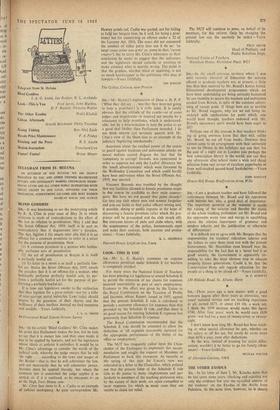SIR,—Mr, Hawley's explanation of Shaw v. D. P. P. ('What
they did say ... was that they were not going to help a prostitute') is a trifle lame. It is surely obvious that the attitude of the courts—or of some judges and magistrates—is inspired not merely by a reluctance to help prostitutes, which is understand- able, but by a determination to help the police to go a good deal further than Parliament intended. I do not think anyone can seriously quarrel with Mr. Cline's view of the Shaw case as an eitample of the judiciary 'legislating unashamedly.'
Assertions about the residual power of the' courts to guard against insidious and unforeseen attacks on .moral welfare cannot disguise the fact that the 'conspiracy to corrupt' formula was resurrected in order to suppress not only the Ladies Directory but the 'small advertisements' which were favoured by the Wolfenden Committee and which could hardly have been unforeseen when the Street Offences Act, 1959, was enacted.
Viscount Simonds was troubled by the thought that any facilities allowed to female prostitutes might in due course be available to their male counter- parts. But have we not passed that point already? Go into any club where men and women forgather and you are liable to find police officers wining and, if possible, dining at public expense in the hope of discovering a female prostitute (after which the pro- prietor will be prosecuted and the club struck off). But everyone knows of pubs and clubs where, with the acquiescence of the police, homosexuals meet and make their contacts, both amateur and profes- sional.—Yours faithfully,










































 Previous page
Previous page